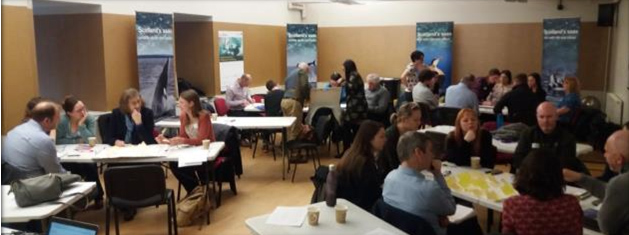Background
For Marine Protected Areas to be successful, management is required that is based on the best available evidence, is supported widely, and includes regular reviews based on monitoring results and new knowledge. Most MPA management plans that have been developed are site-specific. However, there is evidence that the benefits of MPAs may be enhanced by creating MPA networks and by integrating MPA management with wider marine policy and management frameworks.
As well as working with local and national stakeholders, management of MPAs may also rely on collaboration between different countries and administrations to effectively manage border regions and shared bodies of water. This may include the management of MPAs for mobile species, such as marine mammals and seabirds, that move across borders. Different jurisdictions may also have to work together to manage environmental pressures such as pollutants and fishing activity, the impacts of which may be felt across borders.
MarPAMM contribution
The MPA management plans work package aims to increase capacity and collaborations for MPA management planning between the Republic of Ireland, Northern Ireland and Scotland. The main outputs will be six management plans. The plans are being developed jointly by local community representatives, stakeholder groups, academic researchers and statutory agencies, facilitated by project officers. New information relating to the MPAs will be contributed by the other four technical work packages, our sister projects COMPASS and SeaMonitor, as well as data, knowledge and information from stakeholders.
Four regional MPA plans will be produced to achieve a managed network of MPAs:
- Argyll region, Scotland
- Co Down – Co Louth region, NI/RoI cross-border
- North Coast – North Channel region, NI/RoI cross-border
- Outer Hebrides region, Scotland
Two site-based MPA management plans will be produced covering:
- Murlough SAC, NI
- Carlingford Lough SPA, NI/RoI cross-border
The process of developing management plans is intended to go through the following steps: agreeing effective governance; setting up stakeholder groups to define the scope and vision for each plan and to collate existing data on the relevant MPAs; developing measures and actions for the plan; facilitating public discussions and consulting on draft plans; and amending and then publishing the final plans.
Alongside working with stakeholders, the project partners are planning a range of technical workshops to share knowledge and collate best practice on approaches to managing fisheries, connectivity of MPAs and coastal processes. Towards the end of the project the learning from MarPAMM will be shared at conferences and will be published in a lessons learned report.
The management plans produced by MarPAMM will not be statutory. However, they are being produced in collaboration with the statutory agencies in Scotland, Ireland and Northern Ireland. It will be for these bodies to decide whether to adopt the plans at the end of MarPAMM.
MPA outputs
Initially, this work package collated and discussed existing experiences of how to develop effective and successful MPA management plans. This information was discussed at a workshop and used to generate a best practice report.


